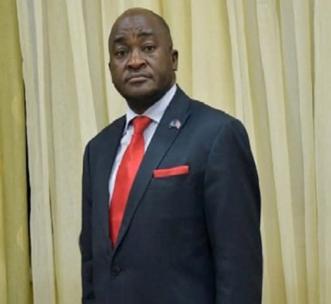The sexual harassment allegations against former Liberian Foreign Minister D. Maxwell Kemayah, stemming from an incident in 2020 involving a Liberian staff member at the UN Mission in New York, continue to cast a long shadow over his career. Kemayah’s recent attempts to address and dismiss the accusations during a radio interview have only reignited public discussion and criticism, notably from Senator Abraham Darius Dillon, who has emphasized the unresolved nature of the issue and its enduring impact on Kemayah’s reputation. This ongoing saga highlights the complexities of navigating such sensitive allegations within a political context, the importance of thorough investigations, and the potential for lasting consequences when such matters are left unresolved.
The central allegation revolves around an alleged incident in January 2020, where Wynee Cummings Wilson, a staff member at the Liberian UN Mission, accused Kemayah of making unwanted sexual advances towards her in his office. Wilson claims Kemayah invited her into his office, locked the door, and propositioned her, creating a hostile and uncomfortable environment. She further alleges that the emotional distress caused by this incident triggered a severe seizure that resulted in her hospitalization and absence from work. Kemayah vehemently denies these allegations, characterizing them as a malicious campaign designed to sabotage his career. This stark contrast in accounts underscores the critical need for a thorough and impartial investigation to determine the truth of the matter.
The handling of the allegations during Kemayah’s confirmation process for the Foreign Minister position in late 2020 has drawn considerable scrutiny. Despite the seriousness of the accusations, no formal, independent investigation was conducted. Senator Dillon recalls advocating strongly for an impartial investigation, along with several other senators, to inform their confirmation votes. However, their efforts were allegedly thwarted by the then-ruling regime, which, according to Dillon, prioritized political expediency over a just and transparent process. This alleged obstruction of justice raises concerns about the integrity of the confirmation process and the potential for political influence to impede accountability.
The Senate ultimately confirmed Kemayah’s appointment, despite the unresolved allegations and the dissenting votes of several senators, including Dillon, who expressed concerns about the potential long-term implications of ignoring such serious accusations. Dillon’s recent remarks underscore the enduring nature of these concerns, as Kemayah continues to grapple with the cloud of suspicion hanging over him. The lack of a conclusive investigation has left the public with unanswered questions and has perpetuated the controversy surrounding Kemayah’s tenure as Foreign Minister.
The controversy is further complicated by conflicting narratives regarding Wilson’s employment status at the UN Mission. The Ministry of Foreign Affairs has disputed Wilson’s claims of being a formal employee, asserting that she was merely an apprentice. Wilson, however, maintains that she was a full-time staff member, providing documented evidence to support her claim. This discrepancy adds another layer of complexity to the case and highlights the difficulty of discerning the truth amidst conflicting accounts. The timing of the complaint, coinciding with Kemayah’s nomination, has also fueled speculation about potential political motivations, further clouding the issue.
The repercussions of the unresolved allegations extend beyond Kemayah himself. Wilson alleges that following her complaint, she was subjected to retaliatory actions, including the termination of her employment and denial of access to the Mission. Additionally, Deputy Foreign Minister Henry B. Fahnbulleh was dismissed from his position, allegedly for attempting to intervene in the case. These alleged retaliatory actions raise serious concerns about the potential for abuse of power and the suppression of voices who speak out against misconduct. The lack of accountability for these actions further undermines public trust and reinforces the perception of impunity for those in positions of power. The ongoing nature of this controversy underscores the critical need for robust mechanisms to address sexual harassment allegations transparently and effectively, ensuring that all parties are afforded due process and that justice is served. The absence of such mechanisms not only perpetuates injustice but also discourages victims from coming forward and reporting misconduct.


